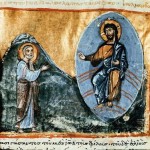
What It’s About: This is one of a series of jubilant oracles from this part of Jeremiah, that recount in various ways the saving power of God. This one adopts the language of God’s firstborn, playing up the metaphor of God as father. The firstborn of a father was, of course, a powerful position for people in a patriarchal society–although, as careful readers of the Hebrew Bible will know, firstborn sons often failed to receive their due in that tradition. This section of Jeremiah imagines Israel being gathered back in, out of the exile and experiences of estrangement, by the hand of God, and finding favor with God (with the “father”) in a powerful way.
What It’s Really About: These few verses contain a dizzying array of metaphors for God. God is a father (v. 9), a shepherd (v. 10), a ransomer and redeemer (v. 11), and a waterer/provider of necessities (vs. 12-14). The sense one gets, reading through this, is that the writer is running through a mental rolodex of ways to describe a certain jubilation with God’s work. This makes sense, if you consider the historical circumstances; return from exile must have felt like an absolute miracle. The utter destruction of a nation, complete with the deportation into exile of all its elites, would have seemed like a national death sentence. But the subsequent defeat of their captors and newfound patronage under a new imperial leader must have come as an unthinkable kind of surprise. It’s not hard to understand, then, the ecstatic language of Jeremiah here. God is a father! God is a shepherd! God has ransomed us! God has provided!
What It’s Not About: This is language that cannot be taken too literally. “They shall never languish again,” in verse 12, is an overstatement to say the least. And the passage ends, in verse 14, with a kind of forward-looking nod to the temple system, in which priests receive the “fatness” of the sacrifice. This is an intensely optimistic read of history, made in the moment of jubilation and excitement. It is, perhaps, comparable to a child’s pledge to “never ignore mom and dad’s words again” after being hurt by doing just that. It is a noble pledge, to be sure, and made in good faith, but ultimately everyone knows that it’s overstating things. Israel did languish again, and it faced many similar and worse catastrophes
Maybe You Should Think About: The language of fatherhood is interesting in the wake of Advent and Christmas. The fatherhood of God over the nation in Jeremiah is in interesting contrast to the fatherhood of God over Jesus; if Jesus is God’s son, as the gospels claim, then is God Jesus’ father in the same sense God is the father of the people? How does father-ness function here? And does thinking about those different modes of fatherhood help alleviate the discomfort many people feel when referring to God as father? Does it redeem the metaphor, in other words?
What It’s About: Here is more fatherhood language: God is Jesus’ father, but God also chose us in Jesus before the foundation of the world. How Jesus was begotten (since God is Jesus’ father) isn’t quite spelled out, but this is obviously from a period well before the “begotten not made” and “eternally begotten” language of the creeds. One gets the sense that the author was completely content to let the ambiguity be, and probably even unaware that he was being ambiguous at all. For this early, period, the claim that Jesus was God’s son, and that that sonship was somehow efficacious for the rest of us, was radical enough.
What It’s Really About: This is an early Christological meditation, in which the author is trying to come up with ways to talk about the importance of Jesus. You can hear resonances here with the Christology of John 1 (see below), in which Jesus is said to have existed before creation. Here in Ephesians, Jesus exists at the beginning (or at least “before the foundation of the world”), and we are thereby included as God’s children. This is a powerful kind of soteriology: we are saved by being God’s children, and the ways later Christian theology has conceived of salvation (blood, forgiveness) are relegated to a follow-on section. The main thing is that we are God’s children; everything else follows on after that. This sort of theological statement would be refined and layered with generations of soteriological tradition later on, but it’s worth appreciating this for what it is: a very early, and relatively simple, attempt at answering the question of how, exactly, Jesus is important to us.
What It’s Not About: It’s interesting to take note of the language of “inheritance” and the rhetoric about being “God’s own people” (v. 14), and put that in conversation with the Jeremiah text above. Who has God as a father? In Jeremiah, it’s the nation. In Ephesians, it’s a more nebulously-defined group that seems to consist mostly of what we would call Christians. The sense in which people are thought of as God’s people had changed, and Christians were now claiming the inheritance that the people of Israel had always claimed. So this is not about traditional models of God’s patronage or patriarchy. This represents a shift in the way Christians, at least, thought of the relationship of God to the world.
Maybe You Should Think About: Paying attention to that shift can help us to understand why early Christians and Jews were rivals, and it can help us to understand the difficulties in Jewish-Christian relations to this day. Competing claims about God’s fatherhood–who, exactly, God was the father of–were hard to reconcile. They still are. Of course, fathers can have many children, and therein might lie the answer for some. Judaism and Christianity have both claimed a kind of exclusivity, though–“God’s only son”–probably as a hedge against just this kind of thinking.
What It’s About: This is the famous prologue to John, the high-Christology exposition of the Logos. It manages to be not only one of the most beautiful passages in the bible (and more beautiful still in the Greek) but also one of the most theologically powerful, with an entire Christological perspective lodged in its lines. This prologue is John’s origin story; John eschews (or does not know about) the shepherds and wise men and stars and decrees of Matthew and Luke, and instead relies on a cosmic Logos hymn to illuminate the origins of the person called Jesus. This passage intentionally echoes Genesis 1, using the same two Greek words to start the gospel that the Septuagintal Greek of Genesis uses in Genesis 1:1. This passage ties the person of Jesus back to the beginning, and not just the beginning of his human life, but to the beginning.
What It’s Really About: Many scholars think that this section (minus the John the Baptist stuff in the middle) was a pre-Christian hymn used by some kind of philosophical or religious sect (maybe the elusive “gnostics”). In that way of thinking about it, then, either the community of the author began using it, or the author of John himself picked it up for use in the gospel, because it helped to encapsulate that community’s thinking about Jesus. The community behind John has long been recognized as a distinct version of Christianity from the ones that produced Paul’s letters and the other gospels. (My favorite book on this is outdated but still quite provocative). This hymn to the incarnate Logos was representative of that community’s traditions about Jesus.
What It’s Not About: This is not the synoptic (Matthew, Mark, Luke) perspective on Jesus. One of the earliest important questions for Christians was the one of when God got into Jesus. Mark kind of punts on the question (but you could maybe point to the baptism as the moment). Mark and Luke place a lot of importance on Jesus’ human conception and human birth. For John, though, the answer is clear; God has always been in Jesus, because Jesus is God. Jesus is that aspect of God that was there at the beginning speaking the creation into being–hence those echoes to Genesis 1:1. In doing this, John’s gospel radically de-emphasizes Jesus’ humanity and point directly to his divinity. Jesus is not adopted as God’s son; Jesus is eternally God.
Maybe You Should Think About: These passages all rely on a metaphor that has proven difficult over the years: the metaphor of fatherhood. What does it mean to call God “father,” and what does it meant to call Jesus, or ourselves, children of God? Is this metaphor outworn, as many claim, or is there still life in it? Can we still call God “father” without a string of asterisks a mile long?















